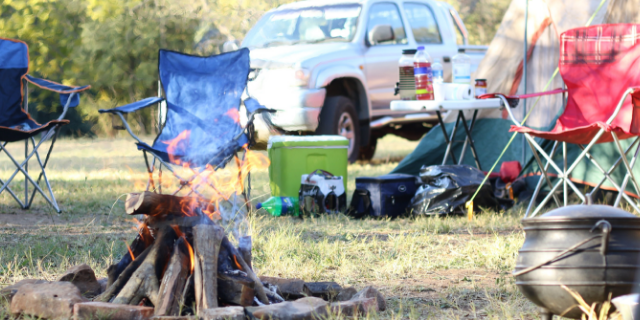Planning a trip in the great outdoors? I love spending long weekends away in nature bushwalking or hanging out at the beach with plenty of outdoor time. These types of trips can be a little more challenging to take care of your skin though. If you don’t want to come home with troubled skin, it’s important to consider your skin’s exposure to natures elements and plan accordingly.
Sunny Days
If you want your skin to age as gracefully as possible, daily sunscreen is a must. Regular applications of SPF throughout the day and a hat are especially important if you’re spending a lot of time in the great outdoors on your break away.
A healthy dose of sunlight is crucial and help our bodies make vitamin D, which is needed for normal bone function and health and regulate sleeping patterns. However, too much time in the sun with unprotected skin is hands down the most damaging environmental factor when it comes to speeding up the skin’s ageing process so choosing your times to be exposed is easy when you think not between 11am-3pm.
The sun gives off 2 types of ultraviolet (UV) rays; UVB and UVA. These two types of rays affect your skin in different ways. UVA can penetrate deeper into your skin layers and destroys collagen; the structural protein vital for firm skin. Sagging, wrinkles and sunspots are caused by UVA.
UVB, on the other hand, doesn’t penetrate as deeply as UVA but it can be blamed for sunburn that leaves your skin dry, red and painful to touch. Overexposure to UVB can increase the risk of skin cancer.
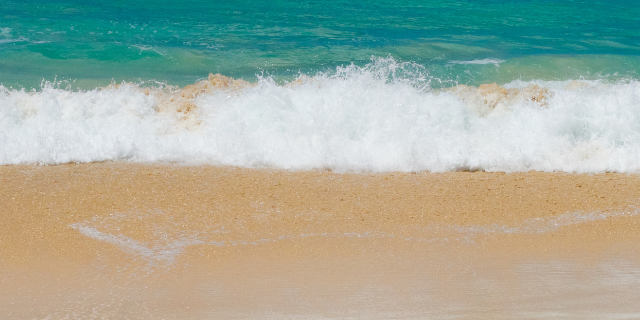
SKINCARE TIPS
Choose a broad spectrum sunscreen. This protects your skin against the damaging effects of both UVA and UVB rays. Don’t forget to apply sunscreen to the backs of your hands, neck and back and well as the face. Even when you’re covered up, these areas are still exposed.
Wear a hat. One with a broad rim to protect your entire face is best. Some of the peak style visors only provide protection for the upper part of your face.
Cover up with long sleeves and trousers. Linen / cotton blends are great for the warmer weather as protect your skin while still allowing it to breathe and stay cool. These natural fibres are also super-absorbent with quick drying time.
Cold, Windy Weather
Wind can wreak havoc on the skin. From chapped lips through to serious windburn, it’s important to help your skin defend itself against those damaging gusts.
Wind and cold weather in general breakdown the thin layer of fat molecules (oil) that in usual conditions helps keep skin moisturised and provides some natural protection from the UV rays. Without this protective layer, your skin is really exposed to the elements.
Windburn presents in dry, red patches of highly irritated skin caused by the combination of overexposure to both sun and wind. It’s an uncomfortable condition and one that can quickly zap the joy out of an outdoor trip.
Chapped lips are a result of excessive dryness; another telltale sign of cold, windy days.
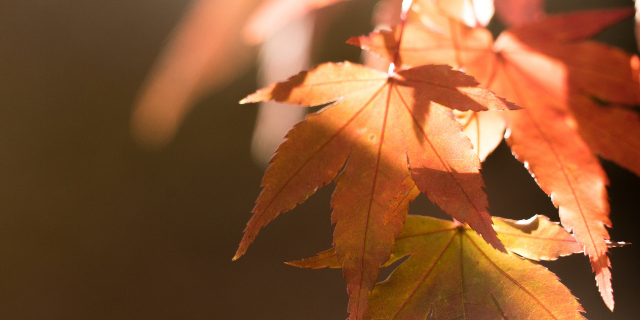
SKINCARE TIPS
Use a quality moisturiser. Keeping your skin hydrated is the key to keeping it healthy during cold, windy days. Look for moisturisers with ingredients like extra virgin olive oil, calendula, avocado oil and aloe vera that deliver a serious dose of hydration naturally. Other ingredients high in antioxidants like green tea, raspberry seed extract will also give you a protective boost as a natural sunscreen. It’s also a good idea to add a serum to your routine, for that extra boost of moisture.
Avoid cleansers that dry the skin. Many cleansers are loaded with chemicals, especially sulfates, that strip the skin even further of natural oils. Spending a day in windy weather, then washing your face with a harsh cleanser is a recipe for skin trouble. These types of cleansers usually leave you with a ‘tight’ feeling. Take care of your skin with natural face cleansers, that nourish your skin rather than strip it.
Invest in a great lip balm. Did you know some lip balms actually strip your lips of moisture? Especially those containing petrochemicals like Vaseline. Like the cleanser, I recommend choosing a natural lip balm that won’t further dry out your lips. Manuka honey and beeswax make a protective combination and we use both in our Manuka Honey Lip Balm.
Bug bites and scratches
It’s not unusual to return from a weekend away in nature with a few bites and scratches. Sometimes these things are unavoidable but how you care for your skin after the bite or scratch will make a big difference. Not treated with care, small wounds can become an infected, nasty mess.
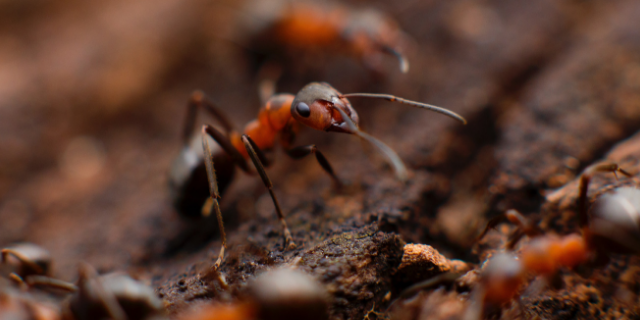
SKINCARE TIPS
Prevention is better than a cure. Do what you can to deter bugs in the first place. Insect repellant is a must have on every outdoor adventure but there are a few toxic ingredients you need to look out for in chemical insect repellants. You can read my post about the natural alternatives to toxic insect repellents here.
Wound healing salves. Take care of your skin post bite or scratch with natural salves that include ingredients like calendula and shea butter that are gentle and soothe irritated skin. Tea tree and rosemary oil have impressive anti-bacterial properties that speed up wound healing. Or try applying a dab of pure manuka honey to the area, it’s also packed with anti-bacterial properties.
Keep it simple
We love the feeling of ‘leaving it all behind’ to escape into the great outdoors. Why not take your camping trip as a chance to literally leave a lot of your skincare and makeup behind? Experiment with a more simple routine, the trees don’t mind your fresh-faced look!
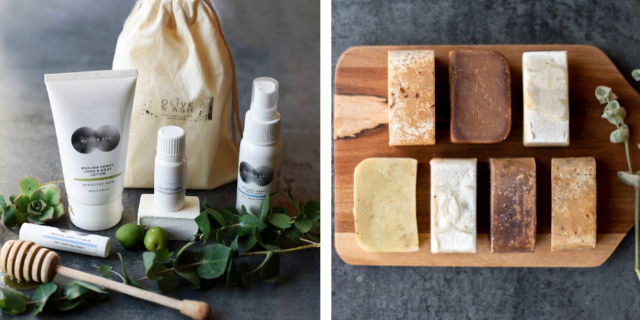
Olive & Ash Hiking Pack and Travel Sized Soaps
SKINCARE TIPS
Use multipurpose products. These are your very best friends when it comes to keeping your outdoor routine simple yet effective. I don’t think you can go past an excellent quality liquid castile soap as the ultimate multi-tasking product. Our Liquid Castile can be used to cleanse your body, wash your hair as well as clothes and dishes! It’s also biodegradable.
Downsize. Take travel or sample size versions of a few of your favourite products. Who wants to be lugging around litres of lotions and potions in a backpack while walking around the great outdoors!
Experiment with no makeup. If you’re used to applying makeup every day, give your skin a break and go barefaced. A makeup-free look allows your skin to breathe and you may find it actually clears up a little with fresh air and no layers of foundation and powder!
What are your tips to take care of your skin for a fresh and healthy glow on an outdoorsy, active break?
Deb x
